Complete this quiz to receive up to 3 FREE best residential solar quotes in Australia, including solar batteries and other renewable options. This quiz will take approximately 1 to 2 minutes to complete. Please read the questions carefully as they will help us pair you with a local installer.
This solar quotes quiz is specifically for residential properties. If you would like quotes for your business or commercial property, please go to our Business & Commercial Solar Quotes Quiz.
You’ve no doubt seen your fair share of ads for ‘Free solar quotes‘ over the years. You may have received calls or even had a knock on the door, from people or businesses all providing free quotes for solar.
So how do you filter out the good from the bad?
Energy Matters have been in the solar and renewable energy industry for over 18 years! Energy Matters has been recognised for our continued excellence in the Australian solar industry. We provide our customers with high-quality resources, insight, and access to reputable solar quotes. Our customer service team will work with you to ensure that you are connected with installers that will provide you with competitive quotes.
Energy Matters is one of Australia’s most trusted solar quotes due to our high customer satisfaction and industry recommendations. You can also rest easy knowing that the solar quotes will be 100% FREE with no-obligation to go ahead.

Once you have successfully completed the residential solar quotes quiz, you an expect the following:
1
The information you provided in the quiz will be sent to up to 3 installers in your area.
2
You will be contacted by the solar installer/s via phone and/or email. Using the information you provided, plus any additional information they may require, you will be provided with a quote for the system you require.
3
You will be free to accept or reject any quote provided by the installer/s. Should you wish to go ahead with the installation, the installer will provide you all the information and steps required.
Energy Matters is proud to provide our Solar Quotes service absolutely FREE to all of our customers! Not only is this service free, but there is no obligation to purchase after you have received your quotes.
Energy Matters does not provide any quotes to our customers. We link you to local installers in your area who will provide you with a free, no-obligation quote.
Our network of trusted installers includes many installers that provide commercial systems.
Our Business/Commercial Solar Quotes Quiz covers commercial customers as well as various other renewable energy needs.
Energy Matters has an Australia-wide network of trusted local installers that we pair our customers with. These installers require detailed information about your energy consumption to provide you a tailored quote that is specific to your needs. As such, your contact details are required for the local installer/s that you are paired with.
We highly recommend getting multiple solar quotes when looking to install a new system, or even when adding to an existing system.
Comparing quotes not only allows you to choose the best system that suits your needs and budget, but it also provides you the opportunity to scrutinise the quotes you get as you compare them to each other.
We encourage all of our customers to do their due diligence when selecting an installer – especially if you choose an installer outside of our trusted network. Ensure that they are Solar Accreditation Australia (SAA) approved and reputable.
Energy Matters has partnered with a number of solar brands, including Tesla! If you would like to get a quote using components of a specific brand (such as the Tesla Powerwall 2 Battery), please head to the bottom of this page where you will find our partnered brands and the links to their specific solar quotes quizzes.
We endeavour to provide each of our customers with 3 quotes, but this is not always possible.
When you complete the Solar Quotes quiz, you are asked a number of questions that are used to match your location and needs with installers in our network. Sometimes, we do not have enough installers in your area (this is most often seen with our regional customers) or the renewable energy system you require is not offered by the local installers in your area.
We do our best to provide quotes to all of our customers, so please do not hesitate to contact us if you are not satisfied with the amount of quotes you receive and we’ll do our very best to locate an installer for you*.
*On rare occasions, we are unable to pair our customers with a local installer (due to remote locations). We are expanding our network of installers regularly.
We aim to ensure that our customers are happy, so in the unlikely event that you are not happy with the quotes you have been provided, please contact us and we will do our best to pair you with other solar installers in your local area. Please note that this is not always possible.
All information is collected, shared, and stored in accordance with the Privacy Act 1988. You can read our terms and conditions here. You will receive a confirmation email upon submission of the Solar Quotes quiz. If at any time you wish to be removed from our mailing list, you can unsubscribe via the link in any of our emails.
Solar power significantly reduces your carbon footprint, making it a green alternative to traditional energy sources.
Costs vary depending on several factors, including location, type of system, and chosen solar company. However, interest-free payment plans and government rebates can make solar power more accessible.
Yes, solar panels work in cold weather in Australia. They are more efficient in cold weather than in hot. They generate electricity from sunlight, not heat, so your solar panels will work even in cold weather as long as there is sunlight.
However, there are a few things to remember if you live in a cold climate and have solar panels. First, the amount of sunlight reaching your panels will be reduced in winter so that you may generate less electricity than in summer. Second, if there is snow on your panels, it can block the sunlight and reduce your output. However, snow melts quickly in Australia, which is usually a minor problem.
While most people think of solar panels as something that gets installed on the roof of a home, there are also portable solar panels available. These smaller panels can be moved and set up quickly, making them great for camping trips or other situations where you need electricity on the go.
Generally speaking, it is worth installing solar panels on your house. Solar panels can save money by reducing electricity bills and providing a return through feed-in tariffs. They also offer a way to reduce your carbon footprint and increase your property’s value. The exact benefits will depend on your local climate, electricity rates, and the cost of the solar system.
The size of the solar system you need will depend on your electricity consumption, your goals for solar (e.g., do you want to offset a portion of your usage or aim for full self-sufficiency?), and how much sunlight your location receives. An average Australian household uses around 15-20 kWh per day, so a system size of around 3-6.6 kW is usually sufficient for many households. However, request a FREE quote from one of our trusted local installers to get a precise answer. The installer will assess your current and future energy needs.
As the world becomes more environmentally conscious and energy costs continue rising, homeowners increasingly turn to renewable energy sources like solar power. Solar energy is clean and sustainable and can significantly reduce electricity bills while reducing one’s carbon footprint.
Solar energy is clean and sustainable and can significantly reduce electricity bills while reducing one’s carbon footprint. For those new to the concept of home solar power systems, this comprehensive guide aims to provide a detailed overview of the benefits, components, installation process, and maintenance of residential solar systems.
Solar can be a tricky thing to understand – let’s discuss how it works and how it can save you thousands!
Solar energy is derived from the sun’s radiation and harnessed through photovoltaic (PV) cells, which convert sunlight into electricity. These cells are typically made from silicon and are designed to generate direct current (DC) electricity when exposed to sunlight. The electricity produced can be used immediately or stored in batteries for later use.
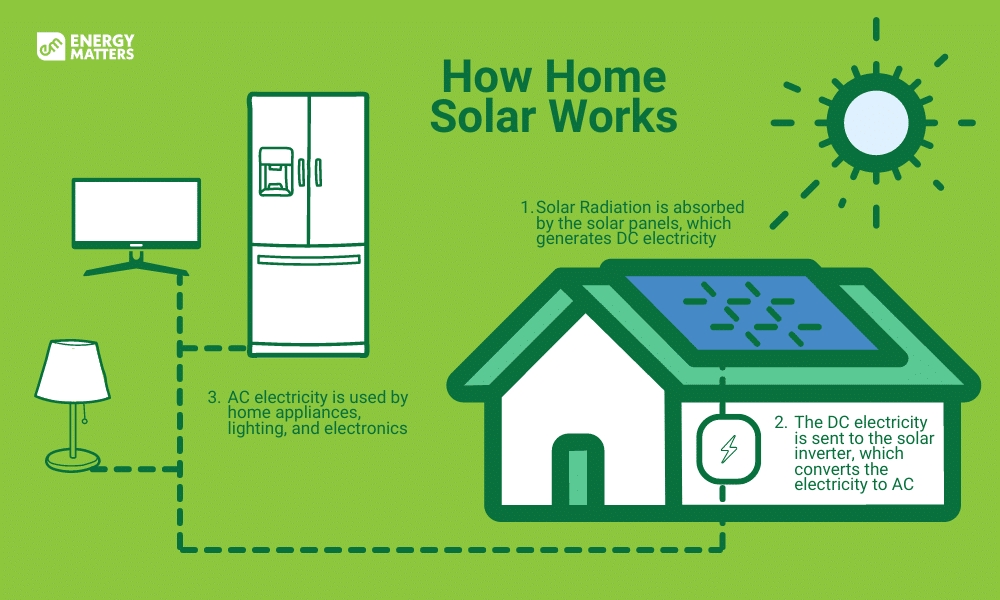
Most residential solar power systems in Australia are grid-connected PV systems without a solar battery. These systems let you maintain your connection to the grid, supplementing your power needs at night and during cloudy periods. Your solar system will automatically prioritise solar energy, resorting to the grid only when necessary. Excess power produced can be sold back to the grid, giving you more electricity for your dollar. Check out our page to learn how a grid-connected solar power system works.
Energy Matters goes beyond simply offering solar panel quotes. Our free solar quotes deepen your energy needs and budget to explore a comprehensive solar solution. Energy Matters’ free quotes can expand the doors to other energy-saving solutions:
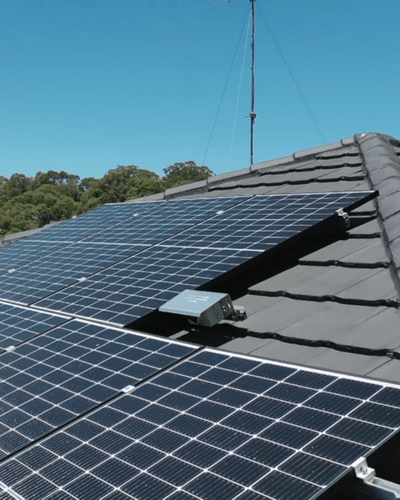
We prioritise Tier-1 manufacturers, known for their top-quality, long-lasting solar panels in Australia that efficiently convert sunlight into clean electricity.

Every business and home solar systems is unique, and Energy Matters recognises that. Our free solar quotes consider your roof size, sun exposure, and energy consumption to design a system that perfectly meets your needs.
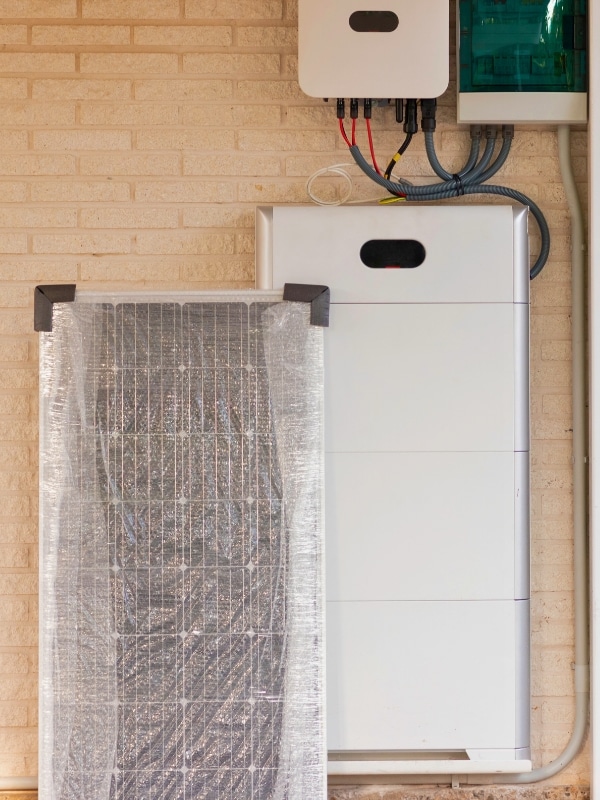
By adding solar batteries to your system, you can store excess solar energy generated during the day and use it at night or during peak energy usage. This maximises your self-consumption and further reduces your reliance on the grid.
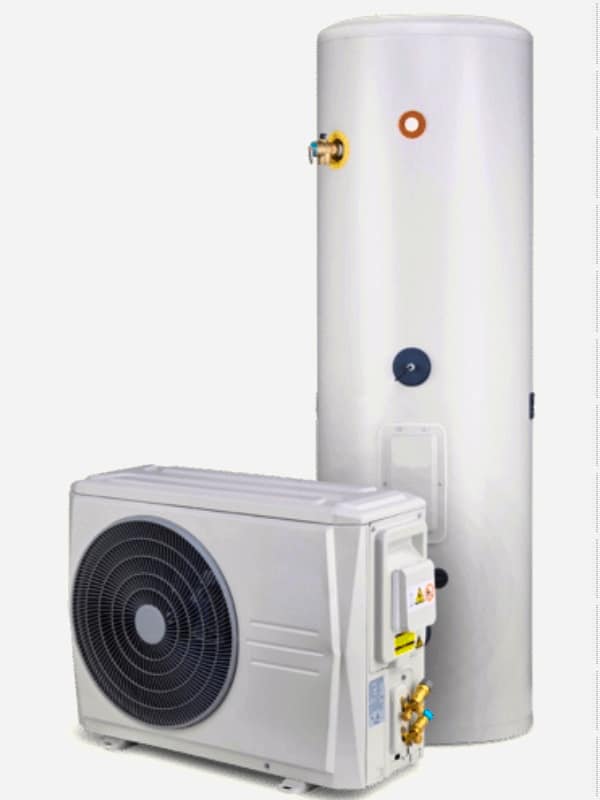
Are you looking to expand your solar power usage? Solar hot water panels can significantly reduce your reliance on grid electricity for water heating.
However, you can install a heat pump hot water system as an alternative to a conventional solar hot water system consisting of solar panels, a collector tank mounted on a roof spring, and solar hot water. Well planned and built, a heat pump system can yield a very rapid return on investment.

Virtual power plants: Thinking ahead? Energy Matters can discuss the possibility of incorporating your system into a virtual power plant, allowing you to contribute to a more sustainable grid while potentially earning additional income.
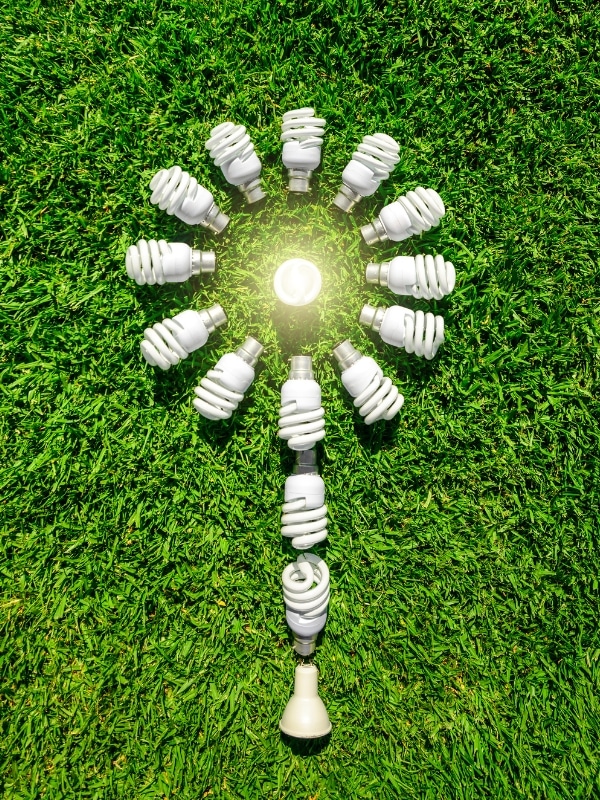
Solar installers often recommend complementary energy-saving measures, such as LED lighting or improved insulation, to maximise your energy savings and reduce overall energy consumption. Check our page to learn more about Energy Efficiency Upgrades.
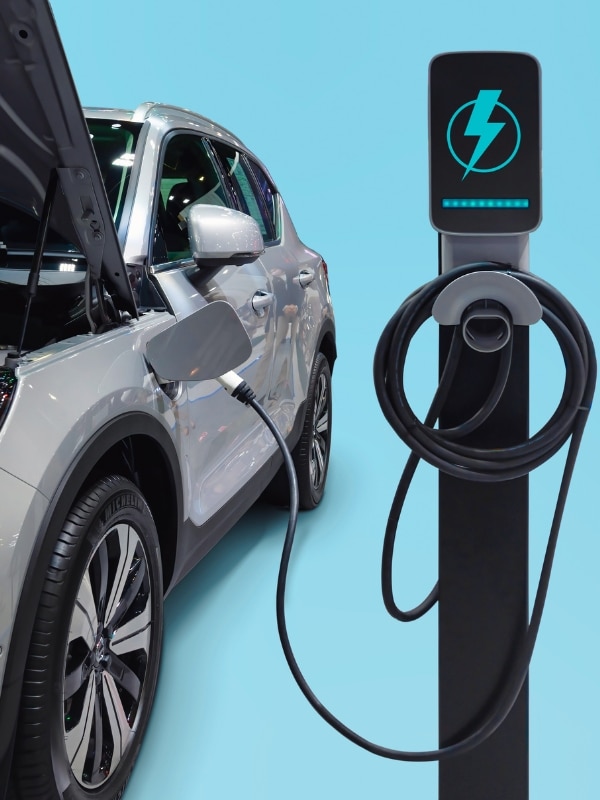
Are you planning to buy an electric vehicle (EV)? Energy Matters can discuss integrating an EV charger into your solar system, allowing you to power your car with clean, home-generated energy.
The core component of any solar power system is the solar panels, also known as PV modules. These panels consist of multiple PV cells connected to generate electricity from sunlight.
Solar panels generally require minimal maintenance because they have no moving parts. Occasional cleaning to remove any dust or debris is typically sufficient. Moreover, solar panels are incredibly durable and can withstand various weather conditions, from high winds to hail. Therefore, your solar panels can last for decades, with all panels available for sale in Australia having a mnimum performance warranty of 25 years.
As the lifespan of a solar panel—which is typically around 25-30 years—comes to an end, it’s essential to consider what happens to these panels once they’re no longer usable. Some solar panel manufacturers have recycling programs to handle end-of-life solar panels. They can recover valuable materials like glass, silver, and silicon for use in new products, thereby reducing waste.
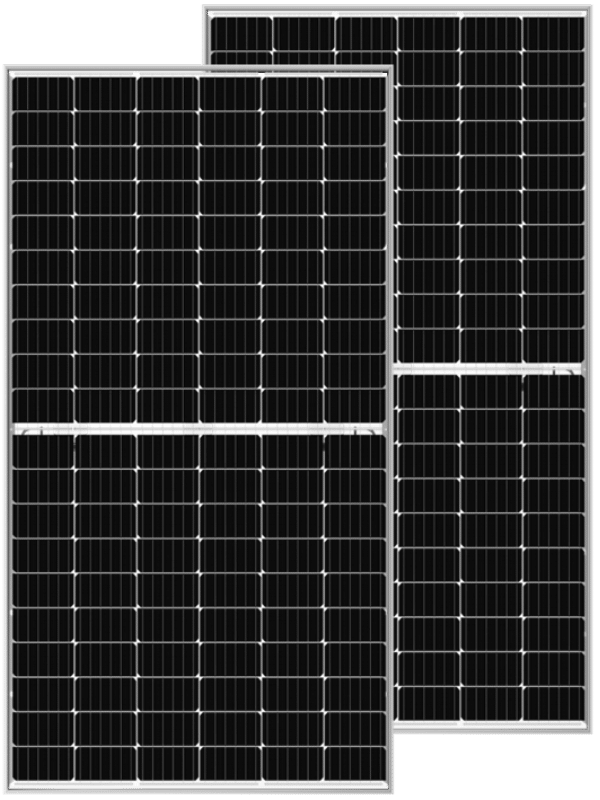
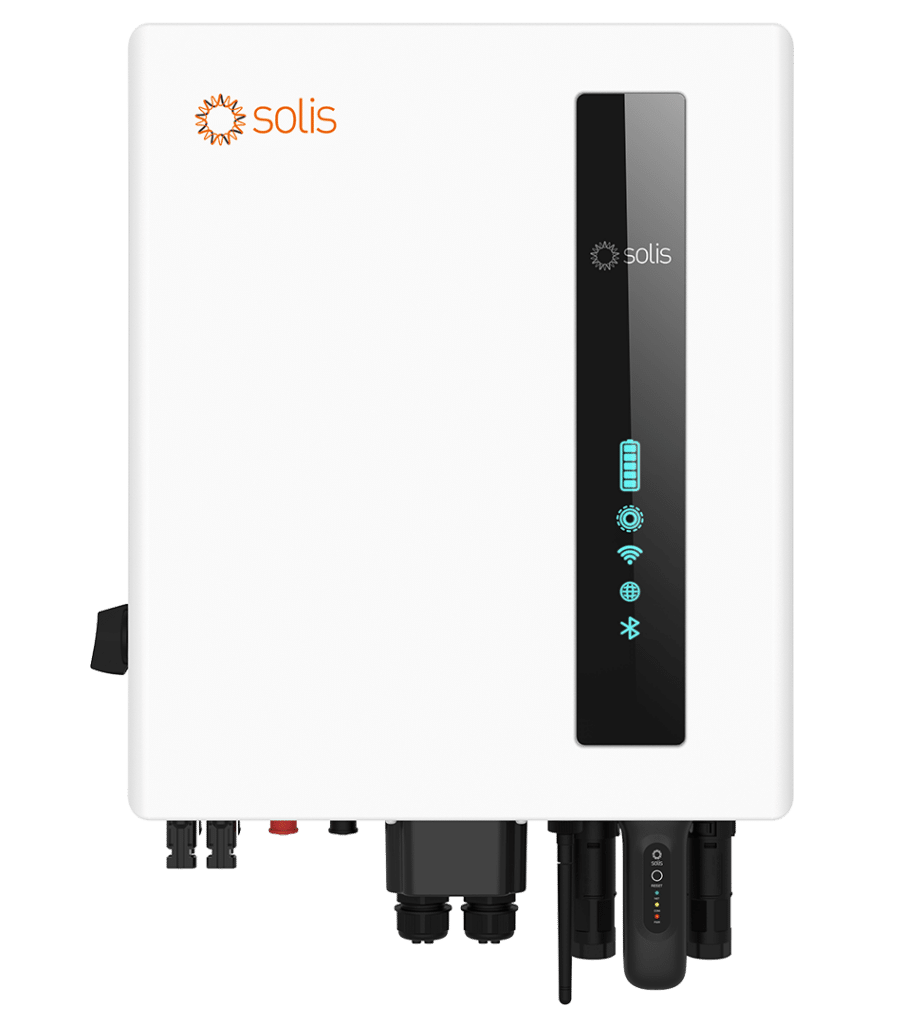
The DC electricity produced by solar panels needs to be converted into usable alternating current (AC) electricity for household appliances. The inverter is responsible for this conversion. The maximum power point (MPP) is the point at which a solar panel produces the most power. Inverters with Maximum Power Point Tracking (MPPT) technology can automatically adjust the output voltage to match the MPP of the solar panel, which helps to maximise the amount of power that is generated.
Battery storage is an optional component allowing homeowners to store excess electricity for use during periods of low sunlight, night, cloudy days, or power outages. However, batteries can enhance energy independence. This can reduce your reliance on grid electricity and lower your electricity bills. The capacity of your solar battery should align with your energy needs and the size of your solar panel system.
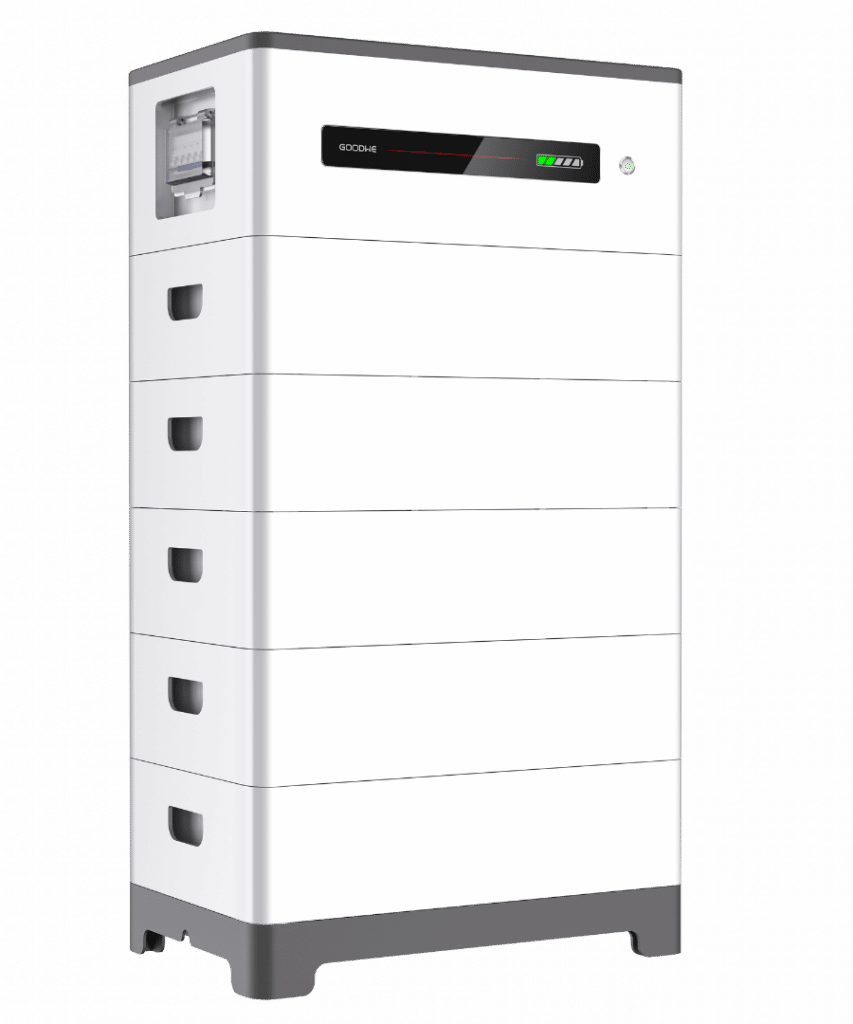
Solar panels are installed on a racking and mounting system, typically fixed on the roof or ground. These structures ensure the panels are securely positioned and angled optimally for maximum sunlight exposure.
Many solar systems have energy monitoring systems that enable homeowners to track their energy production and consumption in real time. This can provide insights into your energy habits and help you optimise your energy use. Furthermore, solar systems can be integrated with smart home technology, allowing you to control and automate your home energy use for maximum efficiency.
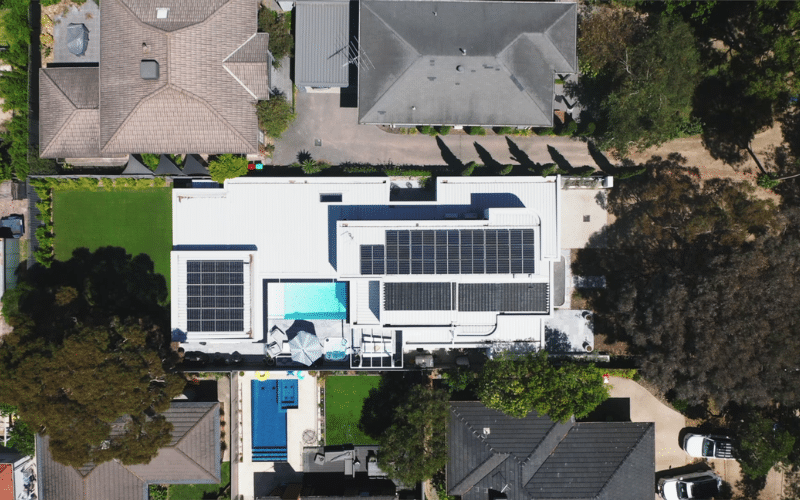
Season 6 Episode 3 of Open Homes Australia transported viewers to an art-deco-inspired property in Black Rock, Victoria. With a huge solar system, battery storage, and a soon-to-be-added addition of an EV charger, the homeowners took use of the latest technology accessible to homes. Learn more: Energizing the Future: The Importance of Solar Panels, Battery Storage, and Other Renewable Energy Technology.
Energy Matters prides itself on working with the best! We have partnered with world-renowned solar manufacturers to bring you top quality recommendations.
We only trust the best solar inverters and batteries on the market, and we’re confident you’ll be happy with your choice. Our top picks for Australia include enphase, Fronius, GoodWe, LAVO, Sigenergy, Solis, Sungrow and Tesla, These inverters are known for their reliability, efficiency, and long lifespan. They’re also backed by some of the best warranties in the industry. And Energy Matters only recommends inverters recognised by the Clean Energy Council (CEC).
One of the primary reasons homeowners opt for solar power is its potential to reduce electricity bills significantly. By generating their electricity, homeowners can offset the need for grid power and potentially sell excess energy back to the grid.
Solar power is a clean and renewable energy source, producing no harmful emissions or greenhouse gases. By installing solar panels, homeowners can actively contribute to reducing their carbon footprint and combat climate change.
Solar power grants homeowners a degree of energy independence. This becomes especially valuable during power outages or emergencies when the solar system can continue generating electricity, provided it is paired with battery storage.
The Australian government offers generous rebates and incentives for homeowners and businesses to encourage the adoption of solar power systems. These incentives can significantly lower the upfront costs of installation.
The role of Small Scale Technology Certificates (STCs)
Australia’s Small-scale Renewable Energy Scheme (SRES) provides Small Scale Technology Certificates (STCs) for eligible solar installations. STCs can be sold to recoup a portion of the cost of installing a solar system, effectively serving as a government rebate to encourage more households to adopt solar power.
Installing solar panels not only saves on energy bills but can also increase the value of your property. As more people become conscious of their environmental impact and energy costs, homes with solar panel systems are becoming increasingly attractive to potential buyers. And studies have shown that homes with solar panels can sell for more than homes without solar panels.
Solar panels can help reduce your reliance on the grid, making you less vulnerable to power outages.
Before installing a solar power system, it’s crucial to assess your home’s solar potential:
Learn more: Solar Panel Rooftop Placement Mapping That Can Help Solar Installations and Which Direction Should Solar Panels Face In Australia?
Solar panel efficiency refers to how well a solar panel converts sunlight into electricity. Higher efficiency means generating more electricity from the same amount of sunlight. Therefore, it’s worth considering the efficiency of different solar panels when choosing the best ones.
Determining the right-sized solar system for your home is crucial to maximising energy production and cost savings. Several factors influence the system size:
Determining the right number of solar panels for your home depends on various factors, such as your electricity consumption, the amount of sunlight your location receives, and the energy rating of the solar panels you select.
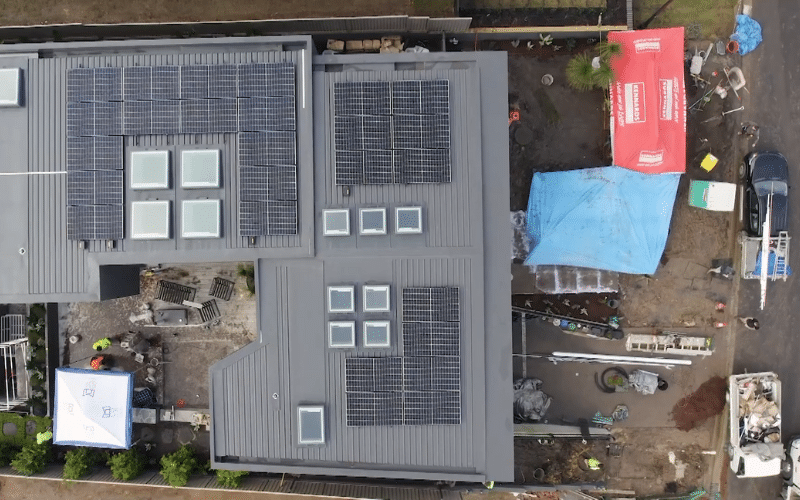
Working with the wonderful homeowners highlighted on Open Homes Australia emphasises the necessity of hiring the most suitable solar installer for the job. Case Statewide Solar was our first choice for the home featured in Episode 1 of Season 6, and what a fantastic outcome for the homeowners. Learn more: Case Statewide Solar: An Energy Matters Retailer Partner.
Solar installers play a crucial role in the solar journey. They are responsible for assessing your property, recommending the right solar PV system, installing the panels, and setting up the connection to your home’s electrical system and the grid.
In Australia, it’s essential to choose an installer accredited by the Clean Energy Council to ensure they adhere to industry standards and best practices.
Once you’ve evaluated your home’s solar potential and determined the system size, the solar installation process involves the following steps:
Once your solar system is up and running, you’ll likely see a significant decrease in electricity bills. The amount you save will depend on how much solar electricity your system produces and how much you consume.
If your system produces more energy than you use, the excess energy is sent back to the grid, and you might receive a credit on your bill. This is known as a feed-in tariff.
Learn more: Solar Feed-in Tariff Comparison: Best Tariffs by State and Territory
Proper maintenance ensures the longevity and optimal performance of your solar power system:
Subscribe today to keep up to date with all things renewable, get the latest news, and receive fantastic deals.








Serving Canberra, ACT; Sydney, NSW; Melbourne, Victoria; Adelaide, SA; Perth, WA; Brisbane, Queensland; Hobart, Tasmania; most Australian cities and regional areas including Gold Coast, QLD and Newcastle, NSW.
© 2005-2024 Energy Matters | ACN: 632 317 545 | ABN: 41 632 317 545